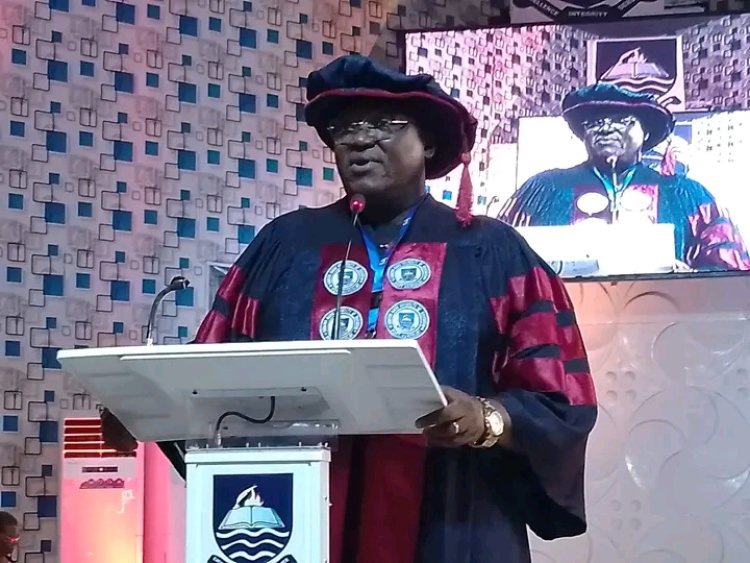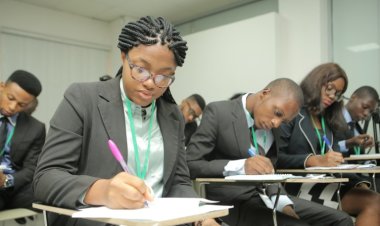IAUE Professor of Educational Management, Prof. Kalagbor Advocates Compulsory Study of Education Law at Tertiary Level
A Professor of Educational Management, Ignatius Ajuru University of Education (IAUE) Professor Levi Doe Kalagbor has advocated for all students in higher institution of learning irrespective of the field of specialisation in education to be made to offer a course in education law to enable them be aware of preventive legal management

A Professor of Educational Management, Ignatius Ajuru University of Education (IAUE) Professor Levi Doe Kalagbor has advocated for all students in higher institution of learning irrespective of the field of specialisation in education to be made to offer a course in education law to enable them be aware of preventive legal management strategies in their everyday activities in school.
Read also: IAUE CONVOCATION: Political Economy is a Driving Force for Sustainable Higher Education
He advocated this while delivering the 54th Inaugural lecture of the University on Thursday May 2, 2024 at the university auditorium. Speaking on the topic, "The Natural Person Versus the Persona Ficta Entity in Nigerian Scholae", the University Don called on the Ministry of Education to establish a legal Unit vested with the responsibility of providing legal advice and services to school managers and teachers at the primary and secondary school levels and for the existing legal Units at the tertiary education level to be sustained, strengthened and to ensure that prompt actions are taken by the school administration in determining cases of staff and students misconducts in line with the prevailing rules of the school and the constitution.
The Head of St John's Campus stressed the urgent need to create a culture of legal rights consciousness and practice in educational institutions in Nigeria. He emphasized the need for regular workshops, seminars, conferences to be organised by Administrators of institutions of learning for themselves, staff and students on the general and specific issues hinging on legal contents in education, including rules, procedures and guidelines.

Many teaching staff according to Professor Kalagbor are not aware of the rights, duties, obligations and responsibilities under the law. They have never read the constitution or the laws, rules and regulations governing the administration of the school system because they feel that it is not their business but the business of lawyers whom they think should have the knowledge of the law and the legal aspects of education.
These stakeholders, the Professor of Educational Management hinted forget the fact that the school and it's members are regulated by constitutional provisions and as such, the school has at present become an arena for litigation.
Read also: IAUE: Demonstrate to the World that You Deserve Your Certificate, VC, Prof Onuchuku Okechuku
The school as a social and formal organisation, the 54th Inaugural lecturer informed requires orderliness, conducive and safe environment to actualize it's objectives of transmitting academic ideas and information and therefore school authorities have the right to make any reasonable rule for the orderly and peaceful conduct of school affairs such rules must be in tandem with its principal laws and the relevant provisions of the constitution, more so because if they fall to abide by the rules of engagement, there is bond to be the tendency for the school to be ineffective in the discharge of its statutory role. Human rights practices in school that violate school members'rights are litigious and could warrant the case of natural person versus the Persona Ficta Entity in a Court of law or a protest to a higher administrative unit in the school, the lecturer opined.

He cited a Court case relating to violation of fundamental human rights in University of Jos Plateau State where the Court ordered the University of Jos to pay the plaintiff (student) the sum of one hundred thousand naira only in damages, reinstates the student, change her supervisor and ensure the final defence of her thesis is done within reasonable time.
The University of Jos had in 2018 withdrawn the student from a Master's degree programme on allegations of poor academic performance without complying with the University's relevant laws, granting the student access to her results and victimisation by the Master degree student's supervisor.

Although the University and lecturer through their lawyer had argued that the Court could not meddle into the internal affairs of the University, the Federal High Court in delivering it's judgement held that it could intervene in the internal affairs of the University where the rules of natural justice are not strictly and reasonably adhered to especially as they did not prove that the student had failed, did not also follow due process when the student filed a petition hence the bringing of the case under the Fundamental Rights Enforcement Procedure Rules. Higher Education providers he stated ought to be aware that they do have a general duty of care to deliver educational and pastoral services to the standard of an ordinarily competent institution that is protecting students from foreseeable risk and harm despite their adult age.
Read also: Inaction of Government Bane of Corruption - IAUE Professor Orluwene
All Professors, faculties, maintenance personnel, security and administrative staff are all employees of the Persona Ficta Entity (university) and so has a duty of care to create a safe work environment and protect these natural person from workplace violence he reiterated.
In his speech, the Acting Vice Chancellor of IAUE Professor Okechuku Onuchuku commended the Lecturer for his brilliance and his analysis which x-rayed the ranking of the rule of law on countries. Out of 34 countries ranked in the sub-saharan region in adherence to the rule of law in 2023, Nigeria regrettably ranked 23rd with Rwanda, Namibia and Mauritius leading the other African Countries.

Nigeria he observed from the lecture also ranked 118th among 140 Countries in the 2022 World Justice Project ranking with Denmark being the top ranked country, followed by Norway, Finland, Sweden and Germany respectively. Nigeria's position in the sub-saharan region and global rule of law landscape shows that she does not have justified systems in place that better ensure justice for citizens, but do has weak legal system while protecting rights of citizens even in the school system the Vice Chancellor stated.
Professor Onuchuku said that this development has led to low level knowledge and poor education law practices in the Nigerian educational institutions to the detriment of the natural person.

While urging lecturers not to use their power to suppress students, he advised them to follow the instant law of the University.
Read also: Ignatius Ajuru University of Education (IAUE) Ranked Top Institution By WES CANADA
The Acting Vice Chancellor also called for advocacy and for orientation to be given to all and sundry to obey laws to avoid litigation in the education system and for the system to be sanitised for peace, progress and development to reign.
Also speaking, the Acting Registrar Mr Donald Okogbaa thanked the 54th Inaugural lecturer for his presentation and hoped that the audience took valuable lessons home fort heir use.





